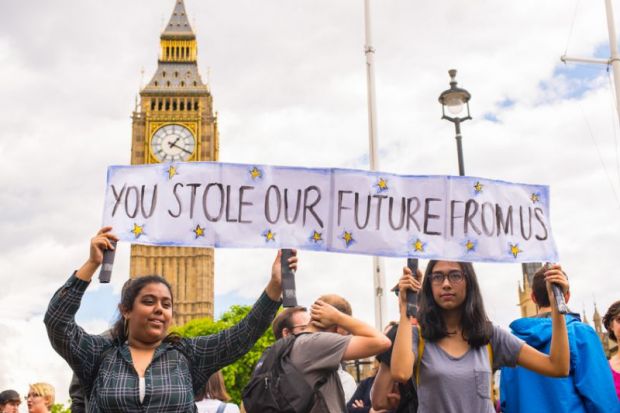There is nothing more uncomfortable for a government minister than a powerful former adviser venting his ire in the national press about your ideas – and then finding leading newspapers supporting the arguments.
Former Cameron adviser Steve Hilton has lambasted home secretary Amber Rudd’s “divisive and repugnant” plans to list every foreign worker. He wants to take the F-word – foreigners – out of the debate and get the government to push for an “Open Brexit”. That is where the red carpet is rolled out for the world’s best entrepreneurs and even for – don’t whisper it any more – students, “people who would contribute to our economy and society”.
Hilton was a Brexiter – not one of my normal allies – but he reveals in the Sunday Times how Boris Johnson and Michael Gove were pushing during the Referendum campaign for an open, outward-looking, enterprising nation. UK vice-chancellors, struggling to get traction in the debate, need to seize upon this and push the government to deliver on at least one of the Leave campaign’s promises.
Stories of academics who are apparently no longer allowed to advise the government because of their country of origin, as we have seen at the London School of Economics this week, are an affront to any tolerant, democratic society. We may be used to taking up arms against bigotry in totalitarian countries, but it is now being openly touted at Conservative Party conferences, and even being applauded.
It is time our vice-chancellors put students centre stage in this debate and told our foreign secretary in plain English, not in Latin (which he is so fond of), what is happening to our academic heritage while he sits conjugating verbs at our Cabinet table.
While they are at it, they should point out to him what the “foreigners” are doing just across the water, in Ireland.
Our Irish cousins and their government are making concrete plans to ensure their universities will become even more attractive to the cosmopolitan student world. International students studying engineering, science and business in Ireland are virtually certain of internships and work experience as part of their undergraduate degree course. They are offered study and work experience programmes at US and global universities – in some cases even leading to twin degrees – which are made all the more attractive by guarantees they will be at Irish prices. More than 90 per cent of graduates from the leading Irish universities are getting jobs.
At the end of either undergraduate or postgraduate study, international students in Ireland are granted visas for a further 12 months to secure a job. If that job is in one of the government’s chosen sectors (IT, bio-tech, engineering and business), it is almost certain to lead to a work permit and permanent residency.
Irish universities have been all too ready to build on the UK’s Brexit dilemma, and there is a strong rumour among admissions tutors that the Irish will shortly extend to international students the right to a full 24-month stay in which to find work. If they do so, they may even be free to work in Ireland for an undefined period, offering a route to residency right across Europe.
As one admissions tutor put it to me last week, “We want these people. Our country needs these people. Our mission is to become the hub in Europe amongst English-speaking universities for the best and brightest students the world has to offer.”
But the Irish are not the only “foreigners” making plans to raid our universities for top students. The Dutch and the US are in on it too. The University of Amsterdam is now advertising more than 150 courses in English at prices that will make UK directors of finance have nightmares. American colleges with European campuses are offering twin-location courses – at the European price, which can be as much as 50 per cent less than if the degree were done solely in the US.
Irish universities are reporting a massive increase in interest from the Indian subcontinent. University College Dublin has launched a four-person office in Gurgaon, just on the outskirts of Delhi. And the recent American College Show in London was elbow to elbow all day every day as both UK and international students in the UK scrambled for offers.
Politicians might not take much notice of opinion polls, but they do notice if the electorate start voting with their feet. This could happen to UK vice-chancellors too. In the run-up to Christmas, they need to order from Santa large bottles of anti-complacency cream and rub it all over their top management teams.
If they want some suggestions to put to Boris, here are three core principles that he will find it hard to argue against.
We need to attract the best, and then keep them. Offering two-year work permits after a degree could do that. This would also prevent them from “disappearing” from Border Agency view at the end of their course – they would have no need to do so. We must bring the world’s best brains into our UK family and harness them for the benefit of the whole country. This is what Boris was saying during the campaign; ask him to put pressure on the rest of the government to deliver on it now.
Second, international students are a social as well as economic asset, so take them out of the immigration statistics altogether and clearly identify their special status.
Finally, if international students are granted work-stay visas, they should be required to patent their inventions in this country, thereby adding still further to the UK’s image as an entrepreneurial hub – something that a foreign secretary can be proud of.
None of these messages was articulated at the Conservative Party conference, but vice-chancellors should not let that put them off. The Conservative Conference is for political anoraks – the people who deliver leaflets, make phone calls and top up the Party’s coffers. It isn’t really a serious political event at all, which is why Mrs May must be shocked that after her speech and that of her home secretary they together managed to knock thousands of pounds off the value of their supporters savings, thanks to the plunge in sterling.
There is now another crack in the Cabinet door, and Boris is big enough to squeeze it open some more. Vice-chancellors must give him a push to ensure that the reality lives up to the rhetoric of the Leave campaign.
David Boddy was political press secretary to former UK prime minister Margaret Thatcher and is head of schools partnerships at SI-UK Education Council, which helps international students to apply to UK universities.
Write for our blog platform
If you are interested in blogging for us, please email chris.parr@tesglobal.com
Register to continue
Why register?
- Registration is free and only takes a moment
- Once registered, you can read 3 articles a month
- Sign up for our newsletter
Subscribe
Or subscribe for unlimited access to:
- Unlimited access to news, views, insights & reviews
- Digital editions
- Digital access to THE’s university and college rankings analysis
Already registered or a current subscriber? Login








